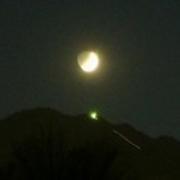
In a sense, the history of astronomy has been a history of the marginalization of life on Earth in our understanding of the universe. When humans first assumed the existence of an Earth beyond the horizons we could see directly, we assumed its centrality in the cosmos. After Copernicus demonstrated that, no, the Earth actually orbits the Sun, and not the other way around, well, it was at any rate our Sun at the center of the cosmos -- even if we now realized we shared it with other planets.
But from there it's been pretty much down-hill for human-centric cosmology: We now know that this Sun of ours is one of more than 100 billion stars in our galaxy; and beyond that, there are [gulp] more than 100 billion galaxies in the observable universe. We also know that our planetary system isn't unique, either; there are in fact many planets orbiting many other stars. Astronomers now believe that planetary systems are actually commonplace in the universe.